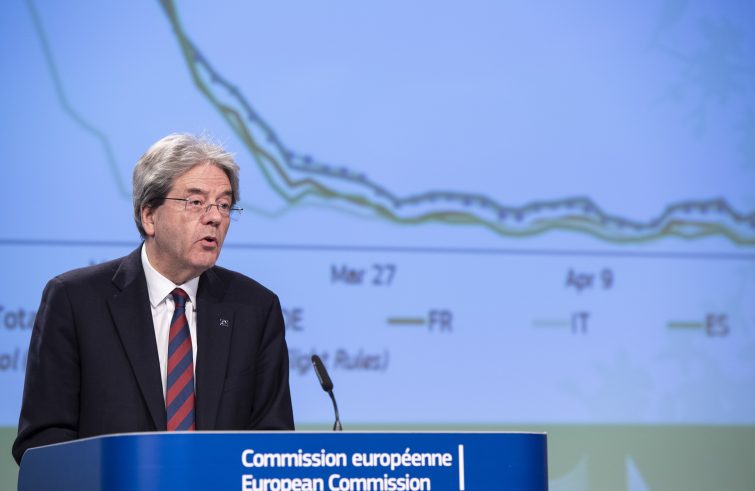
“The coronavirus pandemic represents a major shock for the global and EU economies, with very severe socio-economic consequences.” With its “Forecasts” released on 6 May, the EU Commission confirms the worst fears: this recession will be far worse than that of 2008, and generally comparable to that of 1929 and post-war years.
A “different” crisis? The lockdown imposed by Covid-19, the shutdown of factories and businesses, closed borders, are bringing the production systems of European countries to their knees, while the international situation is equally – if not more – gloomy. Yet this crisis is bound to be rather different from the previous ones. This is because in Europe measures to support economy – businesses, banks, families – and public finances have been put in place immediately, while others (including the Recovery Fund) are being explored. Indeed, the Commission warns: “each Member State’s economic recovery will depend not only on the evolution of the pandemic in that country, but also on the structure of their economies and their capacity to respond with stabilising policies. Given the interdependence of EU economies, the dynamics of the recovery in each Member State will also affect the strength of the recovery of other Member States.”
Europe’s figures. According to the Spring 2020 Economic Forecast, the unemployment rate in the euro area is set to contract by a record 7.75% in 2020 and rebound to 6.25% in 2021. Likewise, the EU economy is forecast to contract by 7.5% in 2020 (and grow by around 6% in 2021). The unemployment rate in the euro area is forecast to rise from 7.5% in 2019 to 9.5% in 2020 before declining again to 8.5% in 2021, while in the EU27 it is projected to rise from 6.7% in 2019 to 9% in 2020 and then fall to around 8% in 2021.
“Some Member States will see more significant increases in unemployment than others. Those with a high proportion of workers on short-term contracts and those where a large proportion of the workforce depend on tourism are particularly vulnerable.”
In 2019 consumer prices are expected “to fall significantly this year due to the drop in demand and the steep fall in oil prices”; inflation is forecast to drop to almost zero. On top of this “the pandemic has severely affected consumer spending, industrial output, investment, trade, capital flows and supply chains. The expected progressive easing of containment measures should set the stage for a recovery.”
- Adina Vălean
- Valdis Dombrovskis (foto SIR/Commissione europea)
- Ursula von der Leyen
The situation in Italy. Gloomy forecasts for Italy: real GDP, at +0.3% in 2019, is set to fall by 9.5% in 2020 before climbing by 6.5% in 2021. Unemployment, at 10% in 2019, is forecast to reach 11.8% in 2020 and stabilize at 10.7% in 2021. The government debt-to-GDP ratio, now at 134.8%, is expected to reach 159% in 2020. National deficit is equally set to increase sharply. Answering questions from journalists following the online press conference, Paolo Gentiloni, European Commissioner for the Economy, said: “Among the largest Member States, Italy was struck first, and most forcefully”, by the pandemic. ” Italy’s economy could gradually recover “with the removal of precautionary measures, the reopening of factories and the resumption of private consumption.” Recovery is projected to start from the second half of 2020. “Nevertheless, Italy’s recovery is forecast to take longer than in other Member States.”
Symmetric shock. “Europe is experiencing an economic shock without precedent since the Great Depression. Both the depth of the recession and the strength of recovery will be uneven, conditioned by the speed at which lockdowns can be lifted, the importance of services like tourism in each economy and by each country’s financial resources.” Paolo Gentiloni addressed various aspects of the macroeconomic framework, and added: “Such divergence poses a threat to the single market and the euro area – yet it can be mitigated through decisive, joint European action. We must rise to this challenge.” The EU document identifies a set of risks linked to the recession that will inevitably affect the whole of Europe. “The shock to the EU economy is symmetric in that the pandemic has hit all Member States”, writes the Commission. However, “both the drop in output in 2020 (from -4.25% in Poland to -9.75% in Greece) and the strength of the rebound in 2021 are set to differ markedly.”
Uncertain scenarios. “At this stage, we can only tentatively map out the scale and gravity of the coronavirus shock to our economies”, pointed out Valdis Dombrovskis, Vice-President of the Commission.
Despite severe recession, forecasts are clouded by uncertainties, while the impact on the various European countries will differ depending on the structure of their respective economies, their capacity to respond with stabilising policies, and on the extent to which the crisis will affect international markets.
“While the immediate fallout will be far more severe for the global economy than the financial crisis” of 2008, for the Commissioner “the depth of the impact will depend on the evolution of the pandemic, our ability to safely restart economic activity and to rebound thereafter.”
Joint response. Hence the recession will be of “historic proportions”, “uneven” (duly considering that it will equally impact Germany, France, the UK and all European countries, as well as economic giants including China and the United Staets), amidst constantly changing circumstances (until when and where will the Covid-19 cause victims and market contractions?). The scars will undoubtedly be long-lasting: unemployed workers, families left with no or decreased income, businesses on the brink of collapse, public finances in freefall. Which is why the Vice-President of the Commission, Valdis Dombrovskis, together with his Italian colleague Gentiloni, pointed out: “Our collective recovery will depend on continued strong and coordinated responses at EU and national level”, while Gentiloni reaffirmed: “Divergence can be mitigated through decisive, joint European action.” EU response must not be long in coming.












